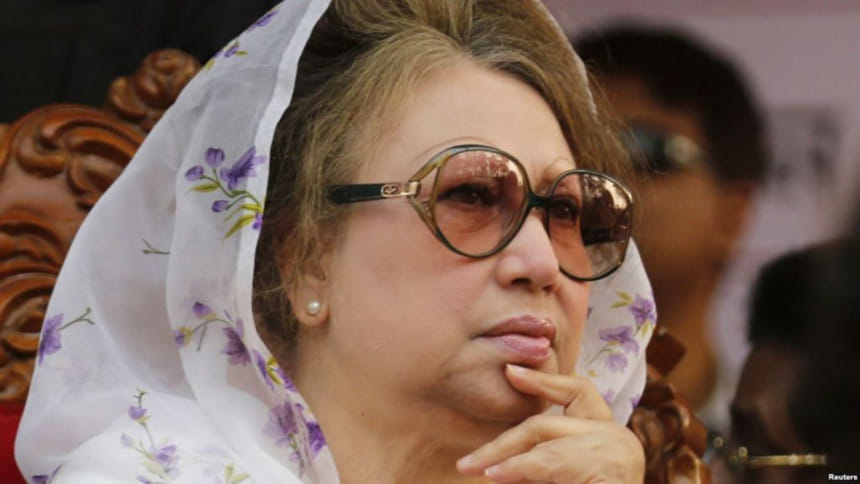Khaleda Zia's numeracy and the 1971 genocide

God knows why BNP chairperson Khaleda Zia chose to make her case at this point in time. Whether it was some divine revelation or a deranged convolution or a dastardly act of political enunciation, she has recently questioned the number of people killed in 1971. What she has said isn't half as difficult to understand as why she has said it now.
It's not clear what political brownie points she wished to score by stirring up a hornet's nest. How does it help, if not hurt, the shaky ground on which she stands today? How does it have anything to do with her political future if three million people were killed or not forty-five years ago? An astute politician should be more focused on mustering numbers on the streets than minding headcounts buried in the graves.
Let's in the name of God cut her some slack and give her the benefit of doubt. Let's say she chose to speak up for the sake of truth and unburden us of a historical blunder. But how exactly has she done it? She hasn't given us an alternative number or explained why she has her reasons to doubt. Of course, she said that different books have given different accounts of how many people were killed by Pakistani soldiers.
But anybody who has read some of those books already knows that those aren't scholarly works but personal accounts of people who closely watched or were close to those who closely watched the Liberation War. As a matter of fact, while so much scholarly work has been done on the history of our Liberation War, very little has been done to ascertain the number of people killed or raped during the nine months of 1971.
Nurul Qadir, who claims to have been one of the four roving ambassadors of the Bangladesh government in exile, has written a book titled Dusho Cheshotti Diney Swadhinata, the first edition of which appeared in 1997. In page 346 of this 720-page book, the author claims he was at the Indian embassy in Tehran on September 5, 1971. There he typed two letters, one addressed to the Shah of Iran and another to the Iranian Prime Minister Amir Abbas Hoveyda. In those letters, he claims, he put down "four million" as the number of people killed in the Pakistani military crackdown in Bangladesh.
Qadir confesses that he had alternately cited "four million" and "three million" at various press conferences and interviews during the war. In the eighth paragraph of that same page, he says that while he was quoting those numbers, he was thinking that 300,000 to 400,000 people were killed by the Pakistan army and their collaborators. At the bottom of the page, he eats humble pie, admitting that he didn't know until after independence that one million was not one hundred thousand but ten hundred thousand, that also when his nephew, who had done his PhD from Singapore, explained it to him.
The tabulation of any genocide does not involve physical count alone but also certain amount of extrapolation. The death toll of the Rwandan genocide is still debated although the UN report of 1994 gives a safe range between 500,000 and one million. The American Indian genocide figures are also vague. It is believed that nearly 80 percent to 90 percent of this population died after the arrival of the Europeans.
The number of Jews killed in the Auschwitz concentration camp during World War II was initially claimed as 9 million, which was revised to 4.1 million. The Auschwitz State Museum tamped down that number to one million 45 years after the Holocaust. Thus, a census of victims in a large-scale population cleansing can go wrong for a number of reasons. Flawed data collection, faulty assumptions, distorted assimilation and motivated conclusions can lead to understatement or overstatement of actual figures.
What has then prompted Khaleda Zia to unsettle settled matters? Why did she want to stir the sleeping dog of a foregone conclusion? But foregone conclusion doesn't mean it can't be challenged for scholarly reasons or historical correctness. It means political impulses shouldn't dominate a matter of factual judgment, and something shouldn't be said or done if it doesn't clarify things for better understanding instead of creating more confusion.
As a two-and-a-bit time prime minister of the country and repository of the trust and adulation of a sizeable portion of its people, Khaleda Zia has every right to tell the truth if that truth tells something. She may or may not have some substance in what she said, but how has it improved our knowledge of 1971? She has only made her admirers more doubtful and critics more spiteful.
It was a waste of breath for her to take on history. She sounded as questionable as the history she questioned.
The writer is editor of the weekly First News and an opinion writer for The Daily Star.
Email: [email protected]

 For all latest news, follow The Daily Star's Google News channel.
For all latest news, follow The Daily Star's Google News channel. 



Comments